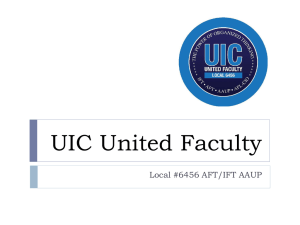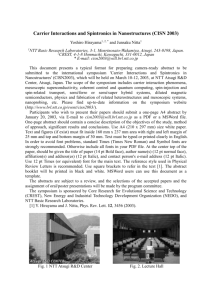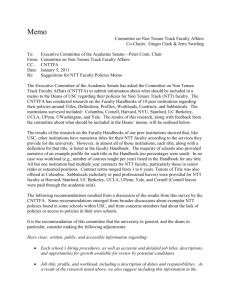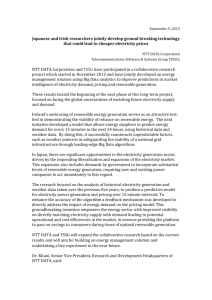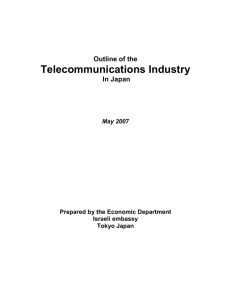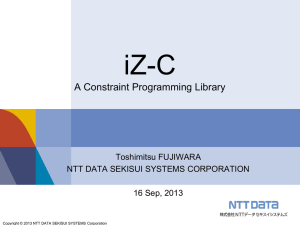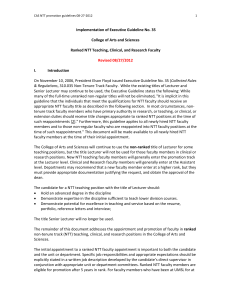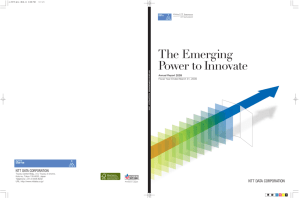NTT Taskforce Report
advertisement
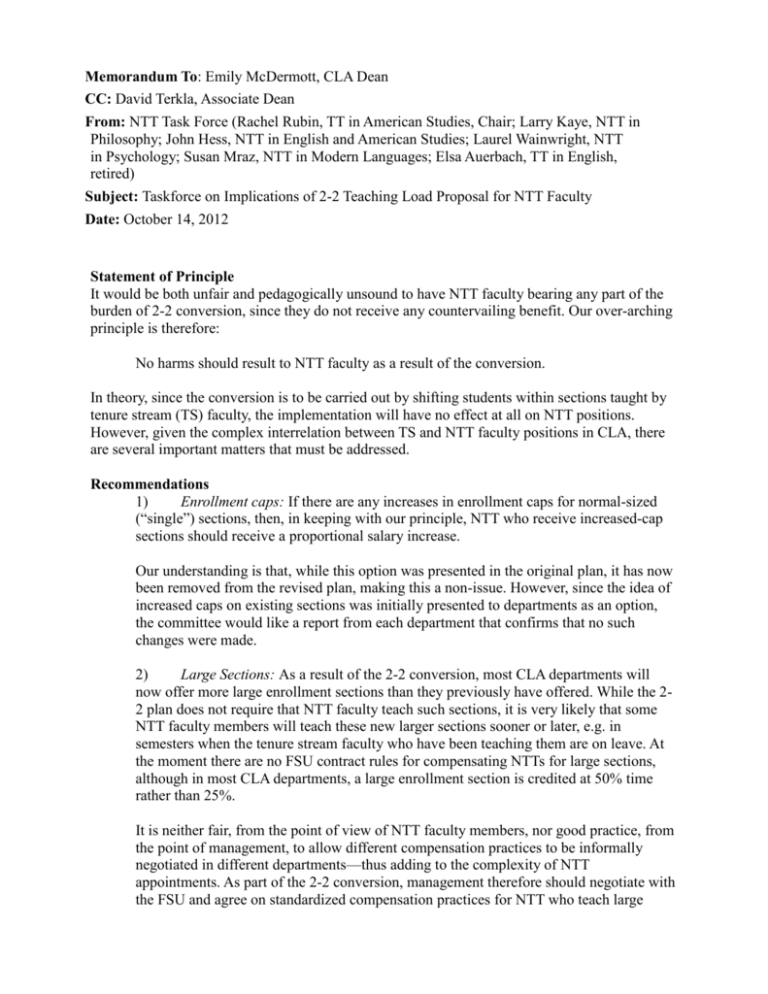
Memorandum To: Emily McDermott, CLA Dean CC: David Terkla, Associate Dean From: NTT Task Force (Rachel Rubin, TT in American Studies, Chair; Larry Kaye, NTT in Philosophy; John Hess, NTT in English and American Studies; Laurel Wainwright, NTT in Psychology; Susan Mraz, NTT in Modern Languages; Elsa Auerbach, TT in English, retired) Subject: Taskforce on Implications of 2-2 Teaching Load Proposal for NTT Faculty Date: October 14, 2012 Statement of Principle It would be both unfair and pedagogically unsound to have NTT faculty bearing any part of the burden of 2-2 conversion, since they do not receive any countervailing benefit. Our over-arching principle is therefore: No harms should result to NTT faculty as a result of the conversion. In theory, since the conversion is to be carried out by shifting students within sections taught by tenure stream (TS) faculty, the implementation will have no effect at all on NTT positions. However, given the complex interrelation between TS and NTT faculty positions in CLA, there are several important matters that must be addressed. Recommendations 1) Enrollment caps: If there are any increases in enrollment caps for normal-sized (“single”) sections, then, in keeping with our principle, NTT who receive increased-cap sections should receive a proportional salary increase. Our understanding is that, while this option was presented in the original plan, it has now been removed from the revised plan, making this a non-issue. However, since the idea of increased caps on existing sections was initially presented to departments as an option, the committee would like a report from each department that confirms that no such changes were made. 2) Large Sections: As a result of the 2-2 conversion, most CLA departments will now offer more large enrollment sections than they previously have offered. While the 22 plan does not require that NTT faculty teach such sections, it is very likely that some NTT faculty members will teach these new larger sections sooner or later, e.g. in semesters when the tenure stream faculty who have been teaching them are on leave. At the moment there are no FSU contract rules for compensating NTTs for large sections, although in most CLA departments, a large enrollment section is credited at 50% time rather than 25%. It is neither fair, from the point of view of NTT faculty members, nor good practice, from the point of management, to allow different compensation practices to be informally negotiated in different departments—thus adding to the complexity of NTT appointments. As part of the 2-2 conversion, management therefore should negotiate with the FSU and agree on standardized compensation practices for NTT who teach large enrollment sections. (Given the expansion that is occurring, such an agreement is advisable not just for CLA, but for the whole university.) While we are not official (FSU or management) negotiators, the following model seems fair and reasonable to us: Someone teaching approximately twice the number of students she or he current teaches in a single section should be compensated doubly, and someone teaching approximately thrice what they current teach in a single section should be compensated triply. Specifically, a large enrollment section should be defined as a section that exceeds existing singe course caps. A round number—which actually exceeds the maximum existing single course caps in most CLA departments—is 40. So, to be more precise, the suggested model is that any NTT section exceeding 40 will be compensated for a double section (50% time), and a NTT faculty member teaching a large enrollment section that exceeds 80 will be compensated for a triple section (75% time). We add that this compensation model must be different from the projected tenure stream model which credits large sections as 1.5 courses, since that rationale is based on the idea that the full-time teaching load for tenured faculty will now be 2 course per term, while the full-time NTT teaching load will remain at 4 courses per term. Finally, the report by the Large Section Task Force calls for graduate teaching assistants or graders to be assigned to large sections, specifying that if the department or program in question does not have its own graduate students to assign, assistants should be drawn from other departments. This recommendation does not directly affect the NTT faculty as a distinct group. Nonetheless, we urge the final articulation of the 2-2 plan to address this point with greater clarity: how will the assistants be chosen and assigned? What provisions will there be for courses that would require greater expertise in their content area than assistants or graders from other departments will bring to the job? 3) Available Work: The conversion should not be carried out in a way that results in a loss of available work for NTT faculty. To this end, our committee requests the following information from all CLA departments: the total number of NTT sections for the department for the spring/conversion term, as well as the total number of NTT sections for the department for each of the last two terms. We realize that there are occasional fluctuations in this number, as a result of variations in enrollments, variations in number of tenure stream faculty on leave or partial release time, and new tenure stream hires. However, if there are any departments that show a substantial decrease in this total for the conversion term, the committee would like to receive an explanation of why this has occurred, and in the unlikely event that the decrease has resulted from the implementation of the 2-2 plan, in keeping with our “no harm” principle, the committee would call for the plan for that department to be altered so as not to cause such a reduction. 4) Cancellation Policy: We recommend that, for the purposes of clarity, the 2-2 revision state a commitment to the maintaining of department-level course cancellation policies (including policy pertaining to a “large section” that enrolls enough to count as a single, but not a double, section). These policies should already be in place, and should not be elided or compromised by the 2-2 implementation. 5) Advising and Administrative Work: We note that reports by other task forces have neglected concretely to account for NTT faculty in terms of certain recommended CLRs; specifically, there are NTT faculty who advise graduate (MA and PhD) theses and there are NTT faculty who take on administrative responsibilities. We strongly suggest that the final articulation of the 2-2 plan explicitly account for this by assuring that NTT faculty members will be compensated in an equivalent way to TT faculty, should they take on this work. Plan for Monitoring Finally, since at present NTT jobs are constituted by a complex semester-to-semester course assignment system, the committee recognizes that many CLA NTT faculty members are wary of potential effects the 2-2 implementation may have in future semesters, even if there are no concerns in the initial conversion semester. We ask that a committee be established to monitor the impact of the transition on NTT faculty for the next few semesters—in particular, in regard to the NTT section totals (#3)—to insure that no such negative effects occur. At that time, our committee would be glad to confirm our approval of the plan without these reservations.
